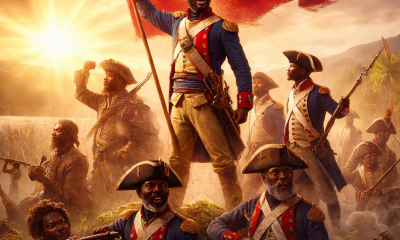History
The Truth Behind Black Friday: The Connection to Racism and Slavery
While Black Friday is widely known for being the biggest shopping day of the year, offering discounts and starting the holiday shopping season, the term “Black Friday” has a deeper, more complex history that has sometimes been overshadowed by consumerism.

Beyond the economic and retail aspects, there are painful connections to the history of racism and slavery in the United States that are often not discussed.
The Historical Roots of “Black” and the Ties to Slavery
Before the modern retail-driven association with “Black Friday,” the term “Black” was historically used to refer to the dark, violent history of slavery, oppression, and racial inequality in America. While many people associate the “black” in Black Friday with accounting (as in “getting into the black” meaning profitability), it is important to understand that “black” historically symbolized a much darker chapter of U.S. history.
In particular, Black Friday has indirect connections to the deep legacy of slavery in the U.S. For instance, the Friday after Thanksgiving was historically linked with the buying and selling of slaves. During the years of legalized slavery, plantation owners and traders would often try to take advantage of the holiday by organizing auctions to sell enslaved people at discounted rates, giving them “special deals” to attract buyers. This occurred around Thanksgiving in particular because it was a time of relative quiet following harvest, making it convenient for sellers to gather buyers.
This practice occurred during the 18th and 19th centuries, particularly in the Southern United States, where slavery was legally entrenched and fueled the economy. The Friday after Thanksgiving was a time when forced labor was put on display, and families could be torn apart as people were bought and sold in the marketplace for cheap. This painful history is deeply connected to the foundations of the U.S. economy, which was built upon the backs of enslaved Black people.
The Commercialization of Racism: The Post-Civil War Era
After the abolition of slavery, the effects of racism were still deeply ingrained in the American economic and social systems. Discriminatory practices such as segregation, voter disenfranchisement, and job discrimination continued to marginalize Black people. The “black” Friday notion was left in the past for the most part, but its historical implications lingered.
In the late 19th and early 20th centuries, Black Friday evolved into a more consumer-oriented phenomenon, but it was still steeped in the context of racial oppression. African Americans were often segregated from mainstream economic opportunities and forced into low-wage jobs, thus marginalizing their ability to participate in the broader economy. While White Americans were celebrated in their commercial efforts and consumption, Black Americans, even when freed from slavery, were still held back by institutionalized racism.
Black Friday and the Legacy of Inequality in Modern America
While Black Friday today is synonymous with discounts, retail deals, and a chance for people to begin their holiday shopping, it also remains a reminder of the systemic inequalities that persist in society. Many major retailers have been criticized for poor working conditions, low wages, and exploitative labor practices. Workers, disproportionately women and people of color, often work long hours under grueling conditions to ensure that stores are stocked and that Black Friday sales happen smoothly.
Additionally, the very idea of overconsumption often reflects the inequality in wealth distribution, where the richest continue to benefit while the poorest—often Black and brown people—remain marginalized and unable to fully partake in the economic rewards. In fact, many of the same corporate structures that profit from Black Friday have deep histories of racial inequality, which are often ignored during the festive season.
The Need for Reflection
When we think about Black Friday, it’s crucial to remember the broader, historical context of racism and slavery that shaped the country’s economic systems, and how this history impacts people of color today. The day should be a reminder not just of great deals, but of the deep-rooted inequalities that still exist and how far we must go to address them. Understanding the history behind Black Friday gives us an opportunity to acknowledge these inequities and strive for more ethical and equitable consumption practices, from both a consumer and a corporate standpoint.
In conclusion, Black Friday is not just about sales and discounts—it’s deeply intertwined with America’s painful history of slavery, racism, and economic inequality. By acknowledging these truths, we can begin to better understand the significance of this day and work toward a more just and equal future.









